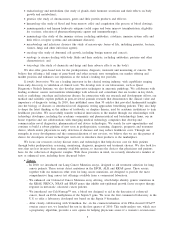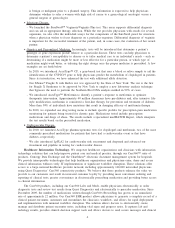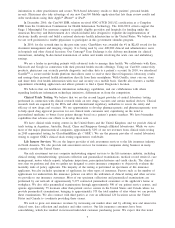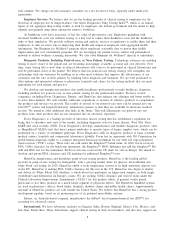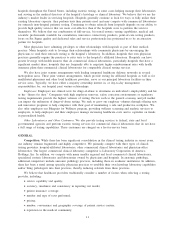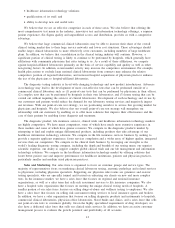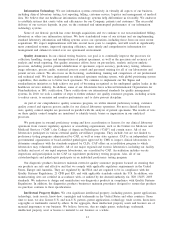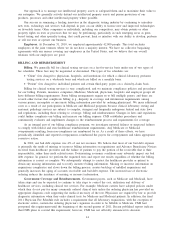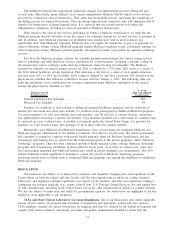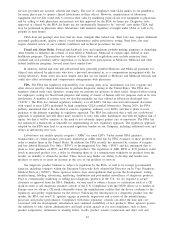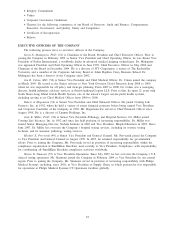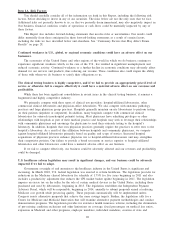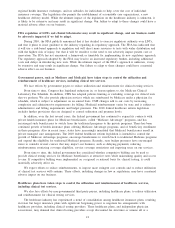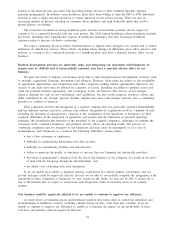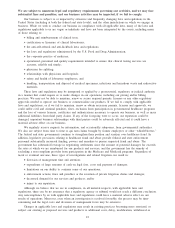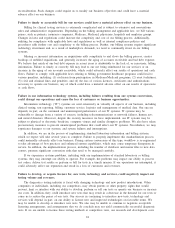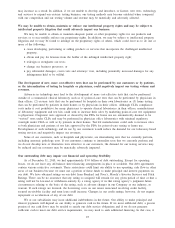Quest Diagnostics 2010 Annual Report Download - page 18
Download and view the complete annual report
Please find page 18 of the 2010 Quest Diagnostics annual report below. You can navigate through the pages in the report by either clicking on the pages listed below, or by using the keyword search tool below to find specific information within the annual report.
The healthcare industry has experienced significant changes in reimbursement practices during the past
several years. Historically, many different local carriers administered Medicare Part B, which covers services
provided by commercial clinical laboratories. They often had inconsistent policies, increasing the complexity of
the billing process for clinical laboratories. They are being replaced with contractors who will administer Part B
benefits for beneficiaries in larger regional areas. It is expected that the revised system will reduce the
administrative complexity of billing for services provided to Medicare beneficiaries.
With regard to the clinical test services performed on behalf of Medicare beneficiaries, we must bill the
Medicare program directly and must accept the carrier’s fee schedule amount for covered services as payment in
full. In addition, state Medicaid programs are prohibited from paying more (and in most instances, pay
significantly less) than Medicare. Currently, Medicare does not require the beneficiary to pay a co-payment for
clinical laboratory testing. Certain Medicaid programs require Medicaid recipients to pay co-payment amounts for
clinical laboratory testing. Medicare patients generally are required to make co-payments for anatomic pathology
services.
Part B of the Medicare program contains fee schedule payment methodologies for clinical testing services,
and for pathology and other physician services, performed for covered patients, including a national ceiling on
the amount that carriers could pay under their local Medicare clinical testing fee schedules. The Medicare
national fee schedule for clinical testing services for 2011 is reduced by 1.75% from 2010 levels as a result of
the 2010 federal healthcare reform legislation. This reduction is the first of a series of such annual reductions
effective from 2011 to 2015. In December 2010, Congress delayed by one year a potential 30% decrease in the
physician fee schedule that otherwise would have become effective January 1, 2011. The following table sets
forth the percentage of our consolidated net revenues reimbursed under Medicare attributable to the clinical
testing and physician fee schedules in 2010.
Medicare Part B
Reimbursements
% of our
2010 Consolidated
Net Revenues
Clinical Laboratory Fee Schedule ................................................... 12%
Physician Fee Schedule............................................................. 3%
Penalties for violations of laws relating to billing government healthcare programs and for violations of
federal and state fraud and abuse laws include: (1) exclusion from participation in Medicare/Medicaid programs;
(2) asset forfeitures; (3) civil and criminal fines and penalties; and (4) the loss of various licenses, certificates
and authorizations necessary to operate our business. Civil monetary penalties for a wide range of violations may
be assessed on a per violation basis. A parallel civil remedy under the federal False Claims Act provides for
penalties on a per violation basis, plus damages of up to three times the amount claimed.
Historically, most Medicare and Medicaid beneficiaries were covered under the traditional Medicare and
Medicaid programs administered by the federal government. Over the last several years, the federal government
has continued to expand its contracts with private health insurance plans for Medicare beneficiaries and has
encouraged such beneficiaries to switch from the traditional programs to the private programs, called “Medicare
Advantage” programs. There has been continued growth of health insurance plans offering Medicare Advantage
programs and of beneficiary enrollment in these plans. In recent years, in an effort to control costs, states also
have increasingly mandated that Medicaid beneficiaries enroll in private managed care arrangements. The 2010
federal healthcare reform legislation is intended to control the growth of Medicare Advantage programs,
encourage beneficiaries to switch back to traditional Medicare programs and expand the eligibility for traditional
Medicaid programs.
REGULATION
Our businesses are subject to or impacted by extensive and frequently changing laws and regulations in the
United States (at both the federal and state levels), and the other jurisdictions in which we conduct business.
These laws and regulations include regulations over aspects of our business, and laws and regulations relating to
conducting our business generally (e.g., export controls laws, U.S. Foreign Corrupt Practices Act and similar laws
of other jurisdictions), including in the United States and in the other jurisdictions in which we conduct business.
We also are subject to inspections and audits by governmental agencies. Set forth below are highlights of the key
regulatory areas applicable to our businesses.
CLIA and State Clinical Laboratory Licensing Regulations. All of our laboratories and, where applicable,
patient service centers, are licensed and accredited as required by the appropriate federal and state agencies.
CLIA regulates virtually all clinical laboratories by requiring that they be certified by the federal government and
comply with various technical, operational, personnel and quality requirements intended to ensure that the
15


